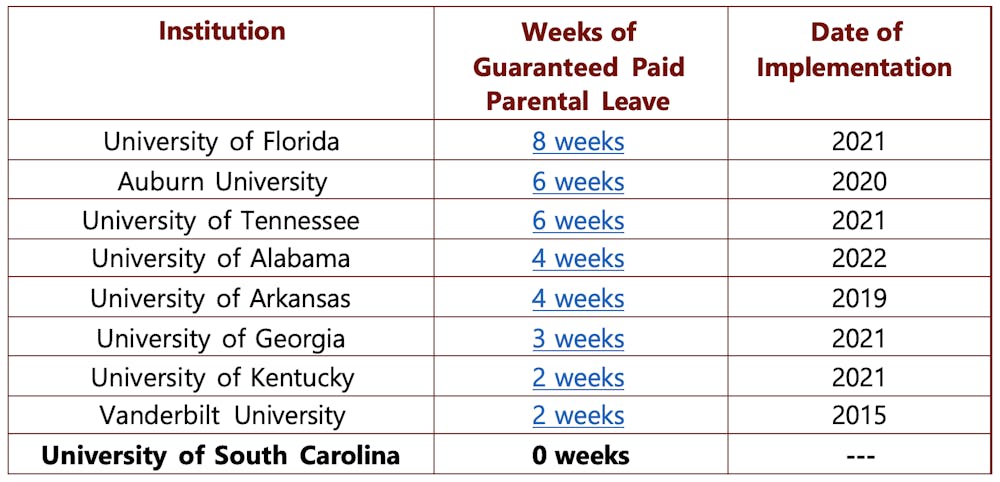Editor's note: Authors Catherine Flowers and Sarah Barnett are members of the Advocacy and Policy Subcommittee of the USC Provost’s Advisory Committee for Women’s Initiatives (PACWI).
The University of South Carolina’s parental leave policy is behind eight of its peer SEC institutions who provide paid parental leave to its full-time employees. As it stands, it takes a full-time South Carolina state employee two years of no time off — no sick time, no vacation time — to earn twelve weeks of paid parental leave, which is the current standard in the U.S.
The Family and Medical Leave Act (FMLA) guarantees a maximum of 12 weeks of job-protected parental leave for the health of parents and children. Although USC guarantees 12 weeks of job protection for new parents, these weeks are unpaid. Employees must use sick and annual leave time they have accumulated in order to keep receiving pay. Many of our peer SEC institutions have established paid parental leave policies since 2020:

Here are some of the current challenges university employees must navigate when accessing parental leave:
- If both spouses are state employees, the couple must split the 12 weeks of FMLA between the two of them. So, if a partner wants to take two weeks to learn life as a family, the mother now has only 10 weeks of job protection. This effectively punishes partners for taking any leave under FMLA when mothers — and babies — need them most for support.
- Employees may only use sick leave for the first six weeks — typically the mandatory leave period for women who deliver vaginally. The rest must be annual leave and may not exceed six additional weeks in the calendar year.
- Rather than providing paid parental leave, the university encourages other employees to donate their leave to their colleagues.
- Employees can take Leave Without Pay if they want to extend their time past their paid sick/annual leave. If they do, they must continue to pay their insurance premiums without their regular paycheck. This expense comes at the exact time that families are most financially and medically vulnerable, since the average cost of a vaginal delivery in South Carolina with insurance is $6,697.16 and $10,036.85 for a C-section.
- Mothers and infants face serious health consequences, and partners lose out on formative emotional bonding time with infants when forced to return to work too quickly. Unfortunately, many do not have a choice when faced with loss of income and insurance.
- Employees are required to share private medical information with Human Resources including whether they had vaginal or non-vaginal deliveries in order to be approved for medical leave.
- Parental leave policies for faculty, staff and graduate student employees show marked inequities. For example, FTE faculty are released from classroom and research obligations for a semester after the birth or adoption of a child, while staff can only be paid up to their accrued leave.
For the reasons above, many employees and their partners may decide to delay pregnancies or seek employment at other institutions where parental leave benefits better support growing families. A growing collection of stories illustrates the challenges university parents encounter under current family leave policies. The university is losing valuable talent, and in turn, losing future female leadership.
A South Carolina House bill offering paid parental leave to state employees passed the House with tremendous bipartisan support in 2021, with a vote in favor 104 to 4. The bill has the public support of Governor Henry McMaster.
After sitting dormant for over a year in the Senate Finance Committee, a companion bill, SC Bill S.11, has gained rapid momentum in the wake of university employees’ push for paid leave over the past month. The bill would guarantee birthing parents six weeks of paid parental leave and partners and adoptive/foster parents two weeks of paid leave for all state employees. S.11 received a favorable report from committee and now waits to be passed by the House.
SC Legislators will have until the end of the legislative session in May to adopt the bill, or it will die. We need the state’s largest employer — the University of South Carolina — to speak loudly to the legislature on behalf of its families. And we need SC residents to email their legislators and urge them to pass this bill.
Passing S.11 is the first step in bettering the lives of USC's families. From there, the university can go further by developing policies that would offer more paid leave to parents. If the university misses this opportunity to support its families, employees will continue to struggle to do what is best for themselves and for their families.
Our committee stands ready to collaborate with university administration in drafting a paid parental leave policy that helps both the university and our families thrive.

